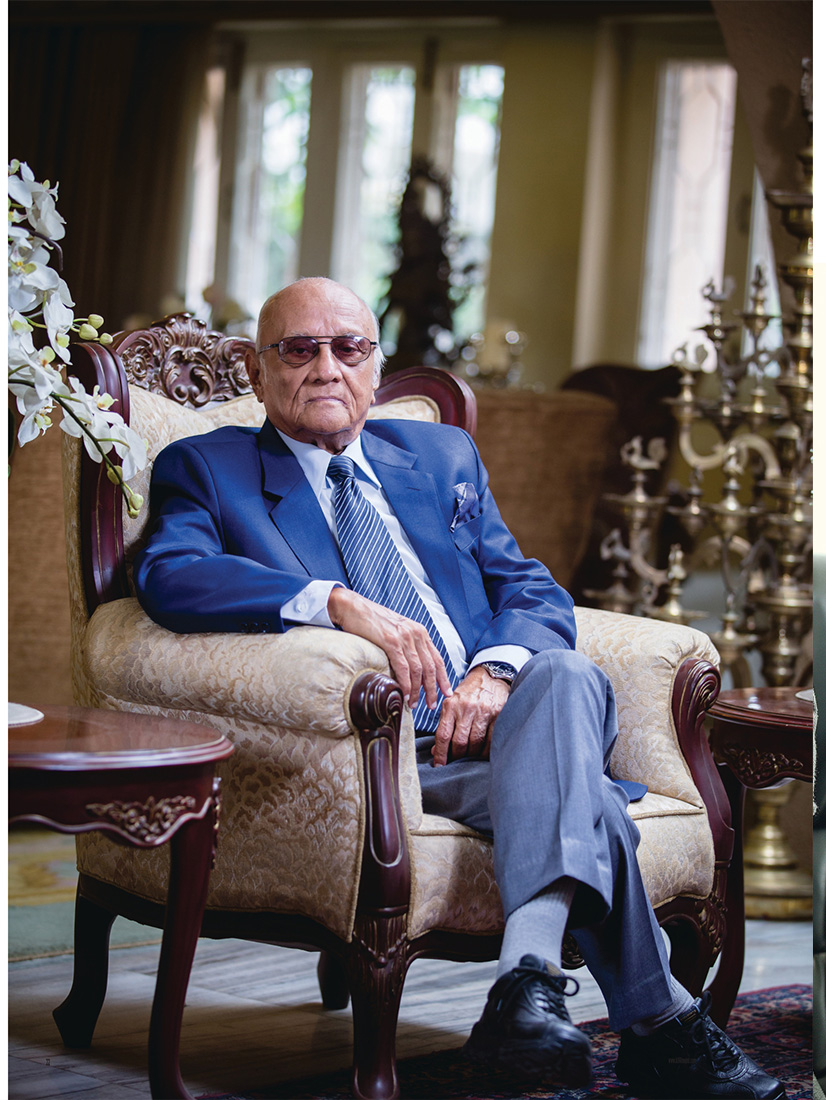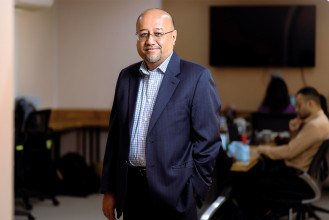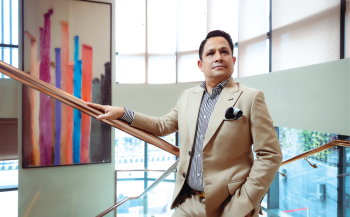
By: Sujan Tiwari
“Most people tend to stand on two legs as they assess their lives. With me, there is an extra leg. Firstly, there is politics which I inherited from my father and from which I can never come out of. Then there is business, it’s not so much about making money, it is more of a sentimental value to me. The third is sports, which has always been my passion. These are the three aspects of my life,” says Rukma Shumsher Rana, Managing Director of Dabur Nepal Pvt Ltd. Rana shares that he inherited politics from his father and was engaged in it since a very early age, “These days I am not actively involved in Nepali Congress, but I am still present in one way or the other”. The second biggest part of Rana’s life is Dabur Nepal. The company is not just business to him. He elaborates, “Right from its inception, I have worked for it and I have an emotional attachment with it, it’s an important part of my life”. The third is Rana’s passion for sports. “I have worked for decades for the development of sports in Nepal,” says Rana. He served with the Nepal Olympic Committee as General Secretary and as its President from 1998 to 2007. He was also Chairperson of the Media Committee of the Olympic Council of Asia and the General Secretary of the Organising Committee of the 8th South Asian Federation Games. He has played important roles in numerous sports associations. “Sport has given me much recognition, it has given me honours that only few Nepali get, and it also gave me the chance to make friends from all over the world,” he says. Rana has received numerous awards and accolades for his contribution to the Olympic Committee and overall development of sports. He is decorated with the Prasiddha Prabal Gorkha Dakshin Bahu in 1998 by the Government of Nepal in recognition for his contribution to the 8th SAF Games. He has also received Award of Merit from Olympic Council of Asia and from Association of National Olympics Committee.
Origins
The son of late Subarna Shumsher Rana, the founder of Nepali Democratic Congress, Rana was involved with the party from its inception. Due to this involvement in the movement for democracy, his family was exiled from Nepal many times, and he spent many decades in India. Rana was born in Calcutta in 1936. Most of his childhood was spent between Calcutta and Birgunj. His father wanted to raise a responsible and capable individual unlike many Rana boys who were having fun drinking and gambling. “He wanted me and my brothers to have proper education, so I was sent to Doon School in Dehradun. It was the most reputed school back then, and is even so now. I received a very good education. The upbringing in Doon School helped shape me into the person I am today,” shares Rana. Rana reminisces about his father being different from other Ranas despite his upbringing being no different from them. “He never pushed me and my brothers into anything. He just wanted us to develop ourselves. He always taught me to believe in myself and not to pay attention to what others say or think about me,” he recalls. The youngest of three brothers, Rukma Shumsher Rana enjoyed his childhood. Rana was about 12 years old when the two Congress parties, one led by his father and the other by BP Koirala, united and became Nepali Congress in 1950. After the revolution was successful and democracy was established, Rana and his family finally came to Kathmandu. His father was part of the new Cabinet as the Finance Minster. Meanwhile, Rana graduated from Calcutta University with a Masters degree in History. In 1960, when King Mahendra took power and enforced the Panchayat system, his family was once again forced to exile and went back to Calcutta. There he got involved in business with his brother Kanchan Shumsher with whom he shares a close bond. “We were in the business of finance and real estate. At that time, two events happened which changed the entire course of my life. My brother died in 1973 when he was only 38 years old. The other thing was, my brother was very friendly with Ashok Burman, then Chairman of Dabur. I was acquainted with him too,” recalls Rana. He and Burman laid plans of opening a plant of Dabur in Nepal when the opportunity arose.
Dabur Nepal
After restoration of democracy in 1990, conditions became favourable for this project. In 1992, Rana and Burman came to Nepal with their plans. They acquired land in Birgunj, set up a factory and started producing a few Dabur products. Then Rana started a company and named it Dabur Nepal Pvt Ltd in partnership with Dabur India. This year, the company celebrates its 25th anniversary.
"Dabur Nepal’s accomplishment is enough to last one man’s life ambition, and I am more than satisfied with what I have done. To cross 10 billion in turnover and to have exports of over six billion is more than enough for me"
Dabur Nepal is one of the major exporters of Nepal. The company exports goods worth Rs six billion, chiefly to India, Bangladesh and Dubai. This accounts to almost six percent of total export from Nepal. The company has also received CIP (Commercially Important Person) award from the government. Dabur Nepal is also one of the biggest tax payers in Nepal, and pays taxes worth almost a billion every year. The company is also awarded as the largest tax payer under ‘export’ category. The company provides direct employment to 1,000 and indirect employment to more than 20,000 people. The major products of Dabur Nepal include Real Juice, Chayawanprash, Dabur Toothpaste and Hajmola among numerous other products. According to Rana, health is fundamental to Dabur in one way or the other. “All our products are targeted to promote human health and well being; no product is out of that realm. Dabur Nepal’s accomplishment is enough to last one man’s life ambition, and I am more than satisfied with what I have done. To cross 10 billion in turnover and to have exports of over six billion is more than enough for me,” he says.
Management Mantra
Rana says his management theory has always been divided into two components. He believes in motivating his employees, and stresses on discipline, self-respect and unity. “Without discipline, nothing functions well. Self respect makes you take pride in your work, and unity is needed to function as a family,” he explains. These are also the core values at Dabur Nepal. “Dabur functions as a family. Despite being a huge company, we all still work united. Everyone is functioning in perfect harmony with the rest,” he says. Besides this philosophy, he says it is important to be ready to compromise. According to him, if you want to win, you cannot stay rigid, you always have to be flexible.
Personal side
When free from work, Rana likes to relax at his residence Swarna Niket in Battisputali with his wife Ishori Rana. His hobbies include reading books and watching movies. “I love animals and birds. In fact, when I sit for breakfast in the garden every morning, I share it with crows, pigeons and sparrows. I get a lot of joy from that,” he shares. Presently, Rana is contemplating writing a book. “Every time I say this to someone, they invariably tell me to write a biography of my father, but I have something different in mind. I would like to write about how I perceived my own life, but not as a biography. I would like to unfold my life along with the accompanying events as a lot of important events have passed before my eyes, from the British dominated Calcutta to Birgunj and then to politics in Nepal. It will be my perception, but will also be about the social fabric,” he says. Looking back at his life, Rana feels satisfied and content, and has nothing to complain about. “I have been able to recover, despite numerous exiles and political turmoil. I have recovered from every adversity, and I have succeeded in everything I have put my mind to,” he states.
Future of Business
Rana says that the country hasn’t been able to fulfil the aspiration of the young, and we cannot keep Nepali youth in Nepal until we create a competitive situation inside the country. According to him, all the big business houses except a few have switched to trading from production. “All big businesses are trading because they think they cannot compete in manufacturing with other countries, but that’s not completely true. There are ways to compete. We just have to look for the ways. We need new industries for job creation and revenue generation. The sensible thing would be to opt for joint ventures with foreign companies, especially with Indians,” he advises.
Life Commitment
According to Rana, he will forever remain committed to the ideals of democracy, and will always work toward strengthening its pillars. A firm believer of democracy, Rana supports free economy and advocates manufacturing and industrial development. He opines that the private, public and the government sectors must work in partnership for sustainable development. Rana is also very passionate about sports, and believes that sport is the foundation on which youth can build successful lives and contribute to nation building.



-1767340083.jpg)

